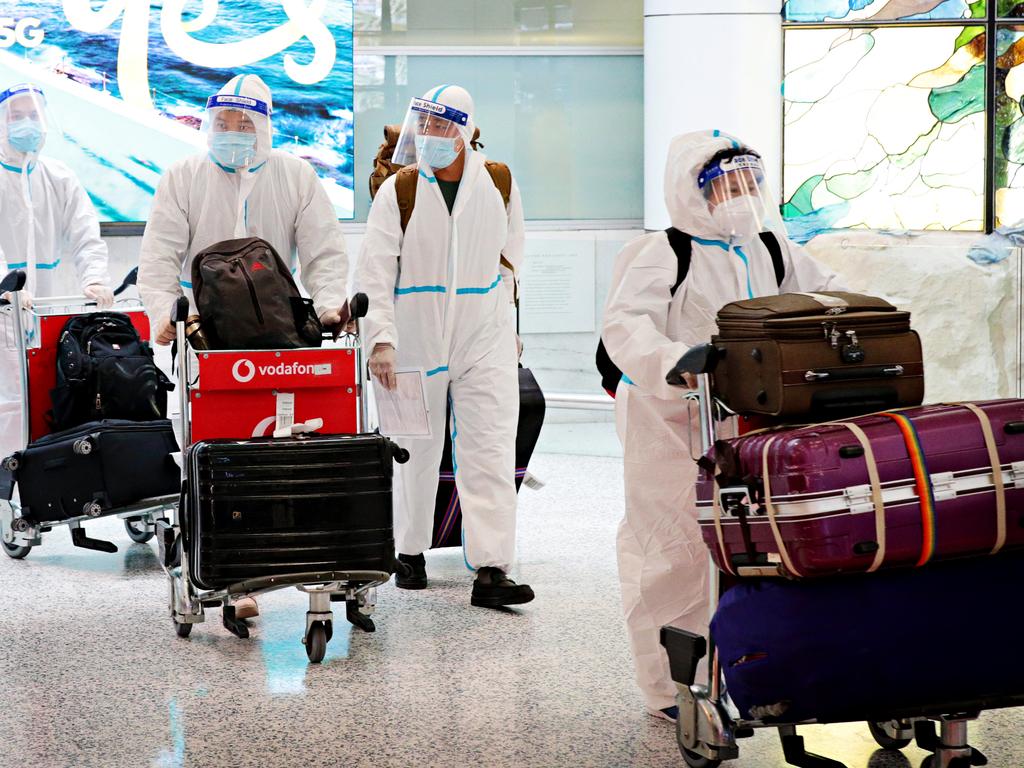Alert, not alarm needed over Omicron virus variant

The nation must also avoid costly overreactions and allow the current strong economic recovery to flourish.
Provided the variant is not resistant to vaccines, Australia’s 86.7 per cent double vaccination rate, one of the highest in the world, should stand the public in good stead.
No rash conclusions should be drawn from the variant’s rapid spread in South Africa, where only 24 per cent of people are fully vaccinated.
Australia’s first two Omicron cases were confirmed late on Sunday among passengers who flew into Sydney on Saturday evening. Both individuals, who were asymptomatic and fully vaccinated, are in isolation in NSW Special Health Accommodation.
Scott Morrison is correct when he says Australia is in the strongest position it can be to deal with a new variant, which is part of the pandemic. His government’s move to bar anyone from entering Australia who is not a citizen or permanent resident and who has been in any of the African countries within the past 14 days where the variant has been detected is proportionate and reasonable. The countries concerned are South Africa, Namibia, Zimbabwe, Botswana, Lesotho, Eswatini, the Seychelles, Malawi and Mozambique.
All travellers arriving in Australia who have been in any of those countries over the previous 14 days must enter now quarantine for 14 days, regardless of their vaccination status.
In addition to the federal measures, NSW and Victoria have announced that all vaccinated travellers arriving from all other countries, regardless of location, must isolate for 72 hours upon arrival.
As more information emerges about the new variant, time will tell whether that blanket isolation requirement, which sets back Australia’s opening up to the world, is warranted.
Omicron cases have so far been detected in Britain, Italy, Germany, Belgium, Israel and Hong Kong, as well as southern Africa and Australia. The spread is worrying. Yet some other variants that also raised alarm bells earlier on, such as Brazil’s Gamma strain, did not take off and wreak the havoc internationally that some scientists initially feared.
Reactions to Omicron around the world vary. New York Governor Kathy Hocul has declared a state of emergency and boosted hospital capacity. Israel has barred entry to all foreigners for 14 days. Britain has reimposed compulsory mask wearing.
Australia has no room for complacency. Authorities overseeing small pockets of the nation with high proportions of unvaccinated people need to step up. Boosters will be increasingly important.
In the national interest, including mental health and the wellbeing of young people, as well as jobs and prosperity, it is vital to avoid kneejerk reactions, especially regressions on borders, travel and, worst of all, lockdowns.

The Reserve Bank’s expectation of 5.5 per cent growth next year is based on the economy experiencing no major Covid outbreaks or restrictions.
With such a high proportion of Australians vaccinated, federal and state governments’ responses to the Omicron variant should be kept in proportion, to do the least economic harm as possible. A targeted approach is needed to minimise the impact on business after almost two years of disruptions, as Australian Industry Group chief executive Innes Willox advises.
While business is getting the economy back on its feet, with strong jobs growth, investment and confidence remain uncertain. An over-reaction to the new variant such as shutting Australia off from the world, and state from state, would be economically destructive.
The worse-case scenario, according to economist Saul Eslake, would be the nation experiencing a “rerun of Delta”. Premiers in the states with the lowest vax rates would use it as a reason to keep their borders closed for longer, Mr Eslake warned, prolonging “the agony for the tourism sector and for universities’’.

True to form, Western Australia Premier Mark McGowan has already announced he “won’t hesitate” to keep his state’s borders shut if the new variant becomes a threat.
The potential of the new variant to cause economic havoc is clear. Its emergence drove financial markets down on Friday and future traders anticipate a plunge in the S&P/ASX 200 index when it opens on Monday.






After the painful experiences of the past 21 months, Australia should approach the Omicron Covid-19 variant, first detected in southern African countries, with caution.